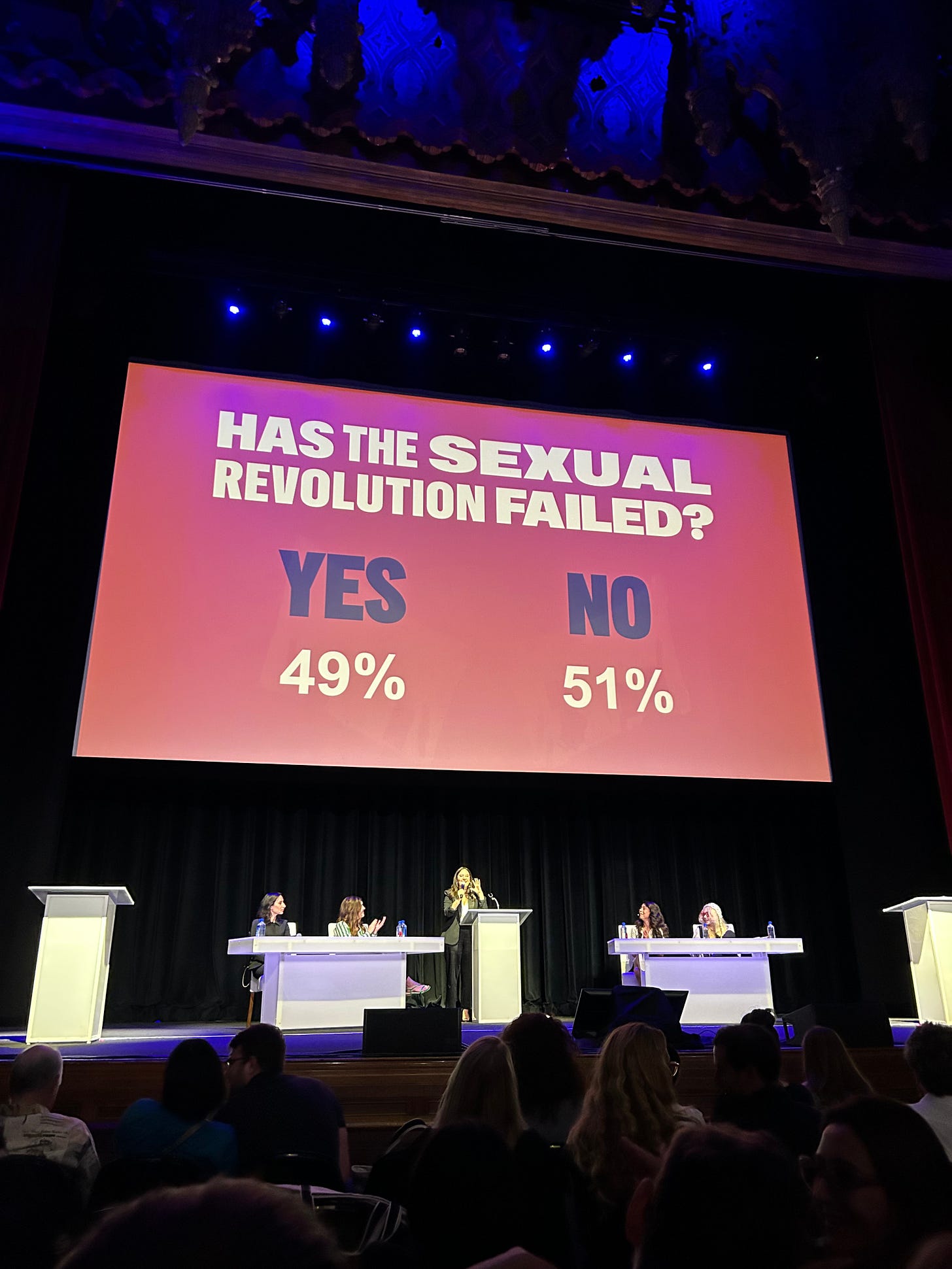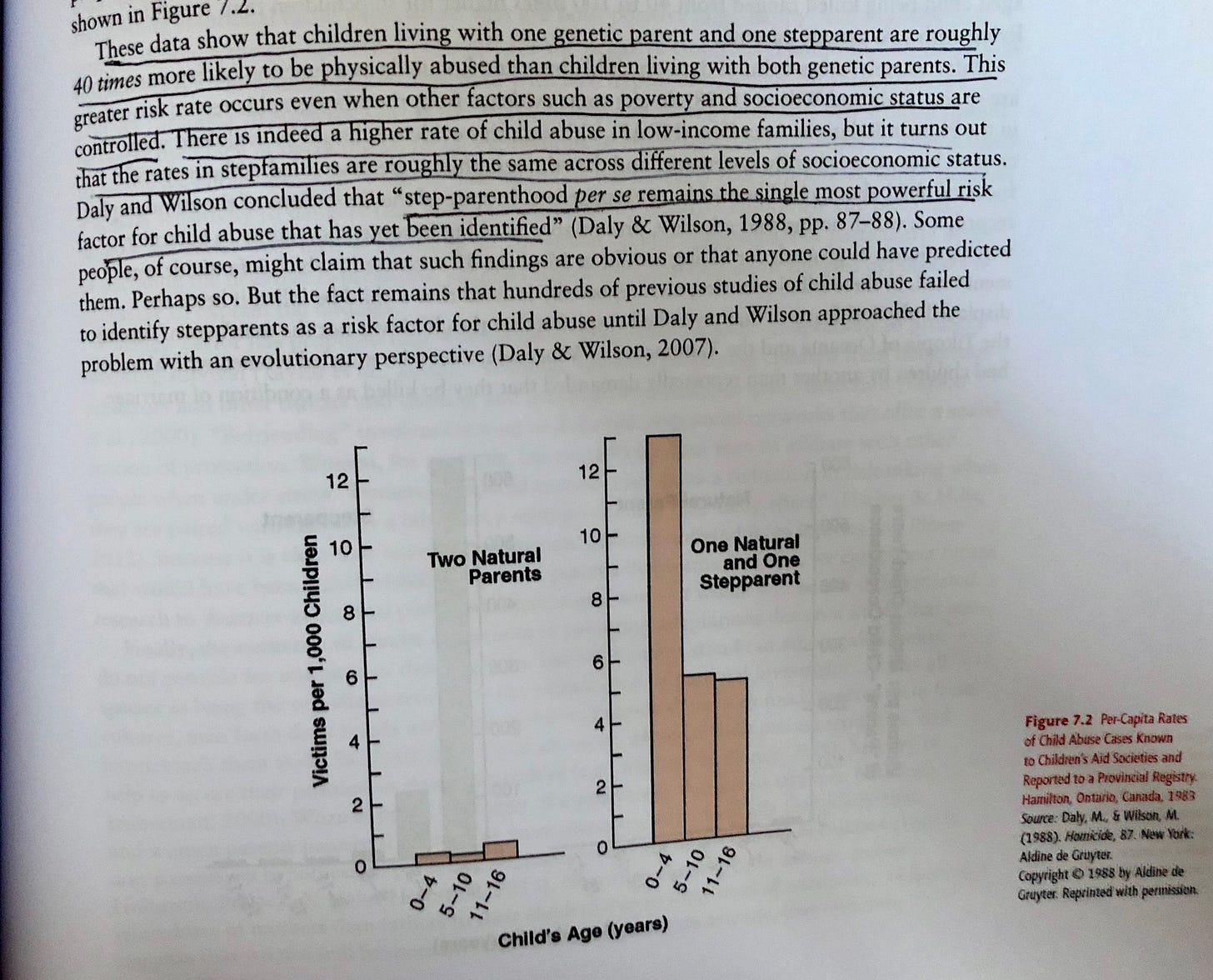The Paradox of Liberation
Reflections on the sexual revolution debate in Los Angeles
A few days ago, I attended the debate about the sexual revolution organized by FIRE and the Free Press. Anna Khachiyan and Louise Perry on one side of the debate, Grimes and Sarah Haider on the other. Moderated by Bari Weiss. Superb event overall. The debaters brought their unique personalities and styles onto the stage. Each side had a debater who argued in a more high-toned and considered manner for their side (Louise Perry who argued that the revolution failed; Sarah Haider who argued it succeeded), and a debater who took a more intuitive and less solemn approach (Anna Khachiyan who argued the revolution failed; Grimes who argued it succeeded). This introduced some variety and texture and levity into what could have been a dry discussion. When Grimes spoke, she reminded me of another musical genius, Kanye West, in some of his interviews. Stream of consciousness style delivery, verbal overload interspersed with surreal and arresting moments of brilliance.
Tim Dillon performed the opening act before the debate. I’ve heard of him, but have never listened to his standup. He was great—I’ll be checking out more of his stuff. I’d also never listened to a single episode of the Red Scare podcast, but Anna Khachiyan was so amusing that I’ve decided to become a subscriber.
At the outset, before the debate Bari Weiss asked the attendees to vote “yes” or “no” on their phones. Forty-four percent of the audience voted “no,” indicating that they believed the sexual revolution failed; 56% voted “yes” indicating they believed the revolution succeeded.
At the end of the event, after the debaters presented their arguments, the results went in the opposite direction, with “no” (the sexual revolution did not fail) eking out a victory.
Personally, I voted “no” both times.
The sexual revolution obviously succeeded in its aim: more freedom.
The answer to the debate description (“The sexual revolution promised liberation. Fifty years on, we ask: has it delivered?”) is obviously yes.
But the reason why a debate makes sense is because many people conflate liberation (freedom) with happiness.
The revolution has unquestionably increased freedom. But it also made people less happy. Many people, though, anticipated that greater freedom would necessarily bring greater happiness.
Sadly the world doesn’t work that way.
We can’t have everything good all at once. We can have some good things, but we can’t have all good things at the same time.
Equally desirable ends often collide. Equally valued aims regularly contradict each other.
Many smart people believe that all good things can be made to conspire towards a final harmonious resolution. Freedom is good. Happiness is good. Naturally, we think (or hope) that these and all other values naturally go together. But they don’t.
The British philosopher Isaiah Berlin repeatedly stressed this point:
“The optimistic view…that all good things must be compatible, and that therefore freedom, order, knowledge, happiness…must be at least compatible, and perhaps even entail one another in a systematic fashion…is not self-evidently true…Indeed, it is perhaps one of the least plausible beliefs ever entertained by profound and influential thinkers.”
Life is full of tradeoffs. Equally good and desirable things cannot be harmonized.
Louise Perry alluded to this during the debate when she quoted the economic historian Richard Henry Tawney: “Freedom for the pike is death for the minnow.”
Isaiah Berlin has likewise written that, “Both liberty and equality are among the primary goals pursued by human beings throughout many centuries; but total liberty for wolves is death to the lambs.”
If you value freedom, that’s fine. But it does have costs. Women today are freer than their grandmothers. But they are less happy.
Researchers have described this as “the paradox of declining female happiness.”
Prior to the sexual revolution, women reported higher levels of happiness than men. Broadly speaking, our grandmothers were happier than our grandfathers. Over the past several decades, though, this has reversed. Men are now happier than women. To be clear, happiness overall has declined for both men and women. Men are less happy than their grandfathers; women are less happy than their grandmothers.
But relatively speaking, men now report higher rates of happiness than women.
The sexual revolution and its accompanying effect of greater acceptance of casual sex have played a role in this.
A recent study found that after casual sex, women, on average, report high levels of loneliness, unhappiness, rejection, and regret. Conversely, men report higher satisfaction, happiness, contentment, and mood improvement.
Another study found that women are most likely to be sexually satisfied in a long-term committed relationship.
Here are the orgasm rates for women, based on relationship type:
Most recent hookup, no prior hookups with this partner: 11%
Most recent hookup, 1 or 2 prior hookups with this partner: 16%
Most recent hookup, 3+ prior hookups: 34%
Most recent sexual event in a relationship lasting 6+ months: 67%
I have not seen data on this but I am confident in saying that male orgasm rates would not vary nearly as much by relationship type. Though more and more men (and probably women too) are orgasming by themselves. Another (unintended) side effect of the sexual revolution.
So what’s more important—happiness or freedom?
For adults, freedom. It’s better for people to have the ability to choose badly than to have no choice at all. Alongside this freedom, though, people are clearly pressured by cultural elites to behave in a certain way. Obviously, you are free to get married young and start a family. But for many young people, you will in all likelihood be berated and teased and told you’d be better off playing the field and having a variety of different sex partners before settling down. That has become the default setting and you have to be an unusually determined person to overcome the peer pressure and societal messaging. You are liberated to do what you want, but invisible forces all around you are influencing you to avoid serious commitment.
But children lack the maturity to make good choices, so for kids happiness is more important than freedom.
So what’s more important, happiness for children, or freedom for adults? Our society has decided, and there’s no going back.
At the debate, there was a lot of attention devoted to discussing the impact of the sexual revolution on men and women—whether the revolution failed women, or failed men, or helped men more than women, or helped women more than men. Nobody asked whether the sexual revolution failed children. People already know the answer.
The sexual revolution gave rise to new laws and cultural norms that made divorce and remarriage and single parenthood and casual no-strings sex easier. This was not without cost.
The closest anyone came to discussing how children’s lives have changed in the wake of the revolution was Anna Khachiyan, who mentioned the Cinderella Effect.
Children living with one genetic parent and one stepparent are approximately 40 times more likely to be abused than children living with both genetic parents. This greater rate occurs even when controlling for poverty and socioeconomic status.
Relative to Baby Boomers, who were raised in intact families by the Greatest and Silent generations, Gen Z and Millennials, who were raised by divorced (or single parent) Boomers and Gen Xers are twice as likely to have had 4 or more adverse childhood experiences before the age of 18 (e.g., abuse, neglect, severe household dysfunction).
Another study found that while only 4% of daughters growing up with their biological father had been abused by him, 17% of daughters growing up with a stepfather had been abused by him. Moreover, the types of abuse committed by stepfathers were more serious and more violent.
Between 1950 and 1995, the suicide rate among adolescents aged fifteen to nineteen more than quadrupled.
If the U.S. had the same level of family stability today as 1960, the country would have 750,000 fewer children repeating grades, 500,000 fewer acts of teenage delinquency, 600,000 fewer kids receiving therapy, 70,000 fewer suicide attempts every year.
From a long article about changes in family structure in The Atlantic:
“If you want to summarize the changes in family structure over the past century, the truest thing to say is this: We’ve made life freer for individuals and more unstable for families. We’ve made life better for adults but worse for children.”
In The Body Keeps the Score, the psychiatrist Bessel van der Kolk estimates that the costs of child abuse exceed those of cancer or heart disease, and that eradicating child abuse would reduce depression by more than half, alcoholism by two-thirds, and suicide, IV drug use, and domestic violence by three-quarters.
We sacrificed the happiness of children for the freedom of adults. And because every adult starts out as a child and carries their experiences with them, we get to live with the consequences.
The supporters of the sexual revolution were victorious. Both in society and at the debate (51% to 49%).
Still, my impression is that, for many people, it’s hard to take a W when it feels so much like an L.




To get a 5% decrease from 56 to 51, 8% of those who originally thought it succeeded had to change their minds (if everyone on the other side stayed the same - which they probably did not). So that 8% of opinions changed is a minimum. No wonder people in power do not want real debate, it works. No wonder real debate is so necessary
A few thoughts
1) “We sacrificed the happiness of children for the freedom of adults. And because every adult starts out as a child and carries their experiences with them, we get to live with the consequences.” So true.
2) The fact, as Rob points out, is they started with the wrong question, and should have asked if it made us happier, not free. This illustrates the importance of asking the right question at the beginning.
3) The pursuit of Meaning is more important than the pursuit of Happiness. Jefferson got it wrong. It should have been, “Life, Liberty and the Pursuit of Happiness.”